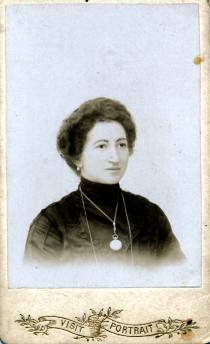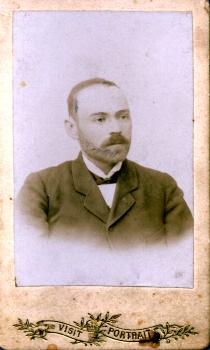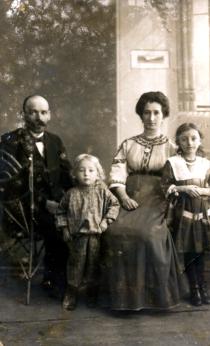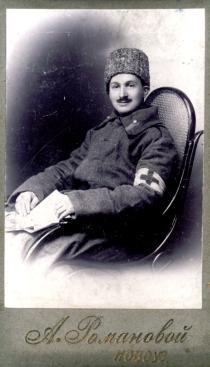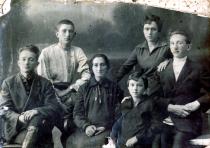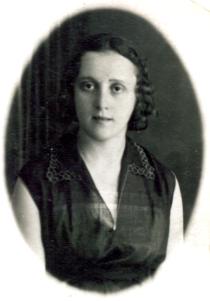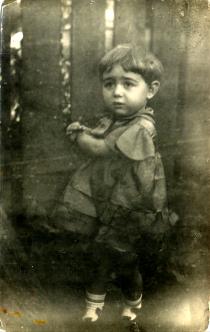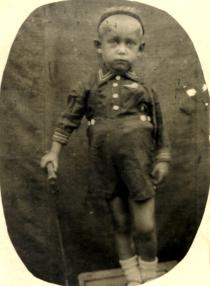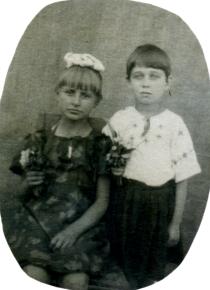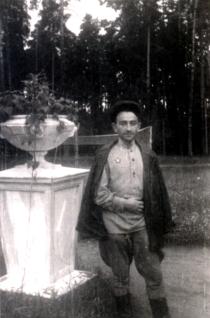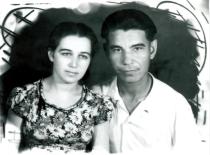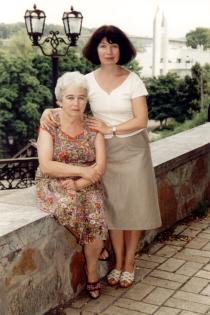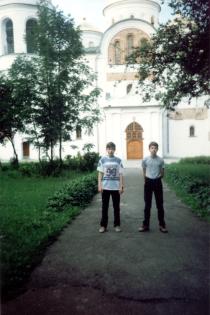This is a picture of me and my husband Shamil Mukhamedjanov, taken in Guriev in 1958. I was pregnant at the time. The photo is signed on the back with the words, 'To Mummy and Daddy and Aunt Genia from their daughter and son'.
After finishing college I got a mandatory job assignment to the telephone company in Chernigov. I was to work as a telephone operator there. I loved coming back to my parents' home. Every now and then guys from the military unit in town called to chat at night in order to stay awake. Once I got an interesting call from a soldier. He began to talk about new books, music and ballet to me. We talked for a while. When I worked the night shift next time he called again. He called every time when I was on night shift and we talked for hours. A month later he arranged a date with me. We met. He was a Tatar and his name was Shamil Mukhamedjanov. He was born in 1931. He was on military service in Chernigov. I liked him at once. I took Shamil to my home. He was polite and reserved. My parents liked him and didn't mind that he wasn't a Jew. When his service was over Shamil left for home. He wrote letters for two years, proposed to me and waited for my consent. I agreed to marry him. We had our wedding in Chernigov in 1957 and left for Guriev in Kazakhstan where Shamil's family lived. My mother-in-law was skeptical about me. A few years later she told me that she hadn't given Shamil her consent to marry me for a long time because I was of different origin. She was afraid that I would ridicule their customs and religion. She didn't care about my Jewish origin in particular - all she wanted was for Shamil to marry a Tatar girl.
My husband's family was religious. They were Muslims. My mother-in-law and Shamil's brothers weren't fanatically religious, but they prayed with their heads facing east. They read the Koran. It was very important to them to respect old people. They didn't work on religious holidays. They didn't eat pork. I didn't see other demonstrations of their religiosity. Frankly speaking, I never gave it much thought. My husband and I had our own life. Shamil told his mother that he wouldn't marry at all if he couldn't marry me. He was the oldest son and, according to Islamic law, the others could only get married after he was. My mother-in-law had to give in. She never regretted it and liked me a lot. I also treated their family nicely. Guriev was a small provincial town with pise-walled houses and small vegetable gardens near the huts. People were friendly and there were no nationality conflicts. Many Russians came to work in the town. New houses and educational institutions were being built. There was a mosque in the center of town where older people gathered on religious holidays. Younger people weren't religious and didn't observe any religious traditions.
I worked at the telephone station for some time. Shamil was a geologist and manager of a geological survey group. We rarely saw each other. Shamil only stayed at home in winter. Our daughter Natasha was born in 1958. She was a very sickly girl. The doctor said that she was having problems living in the continental climate of Middle Asia and that I should rather take her to my hometown. We took Natasha to Chernigov and she stayed with my parents. My mother worked, so we hired a baby-sitter for Natasha. My husband and I returned to Kazakhstan.
When we returned I joined Shamil's geological group and began to work as a time-keeping accountant there. I still enjoy recalling those years - they were probably the best years of my life. This geological group searched for oil. We were following seismic and mapping specialists to carry out the initial survey and the group following us did the in-depth survey. Everything was new and interesting to me. We lived in tents and cooked food on the fire place. We drank water from springs and lakes, baked bread and sang songs sitting by the fire at night. Shamil and I were very much in love. I never complained about anything. I felt good to be where he was.

